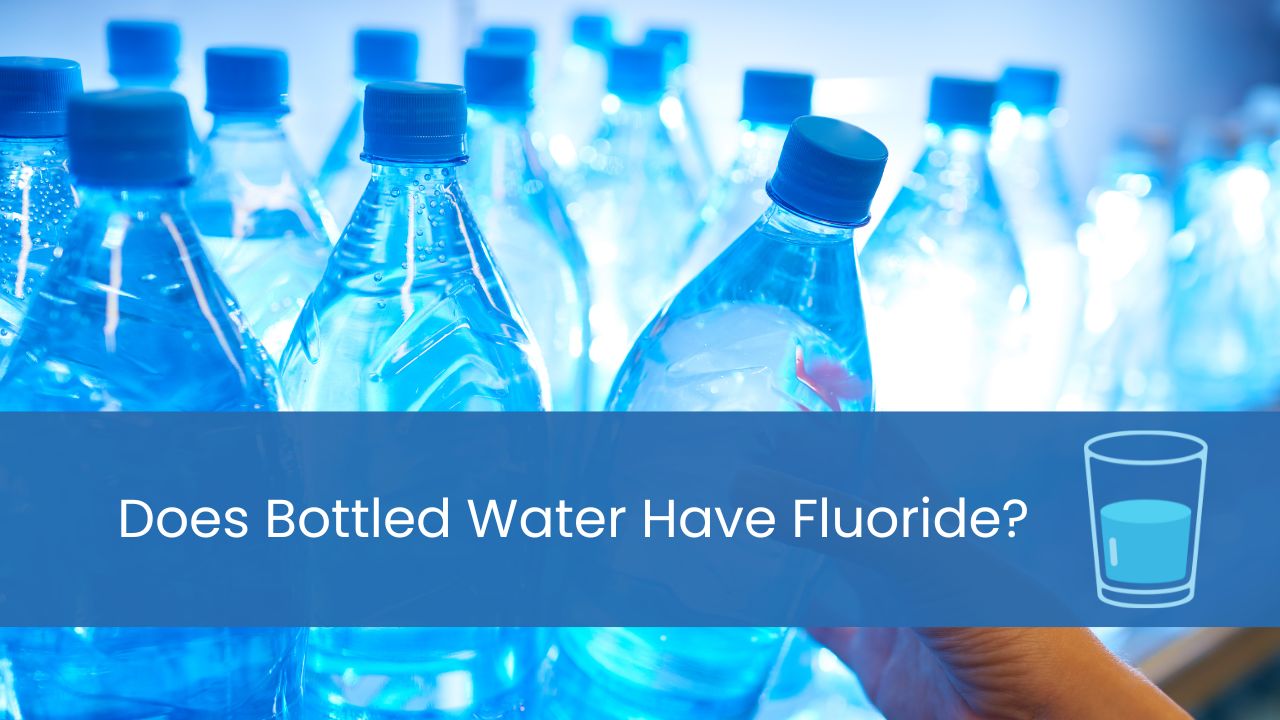Are you someone who only drinks bottled water? Do you ever wonder if there is fluoride in your bottled water? The answer may surprise you.
While some brands of bottled water do contain fluoride, others do not. It’s important to know whether or not your favorite brand of bottled water contains this mineral, as it can have a significant impact on your oral health.
In this article, we will explore the topic of fluoride in bottled water and provide you with a list of brands that contain it and those that don’t. We’ll also discuss why companies choose to add fluoride to their products and whether or not drinking only bottled water puts you at risk for missing out on the benefits of this essential mineral.
So, sit back and get ready to learn everything you need to know about fluoride in bottled water!
Key Takeaways
- Some brands of bottled water contain fluoride, while others do not, and companies are not required to add it.
- Fluoride is commonly added to bottled water to help protect teeth from decay, but most brands do not have sufficient levels.
- Fluoride can also be found in tap water, supplements, and certain foods and oral hygiene products.
- It’s important to speak with a healthcare professional about your specific fluoride needs, as excessive consumption can have negative health effects.
Table of Contents
- Key Takeaways
- Is There Fluoride In Bottled Water?
- Bottled Water Without Fluoride
- List Of Bottled Water With Fluoride
- Why Do They Put Fluoride In Bottled Water?
- Am I Missing Fluoride By Only Drinking Bottled Water?
- Do Filtered Water Bottles Get Rid Of Fluoride?
- Conclusion
Is There Fluoride In Bottled Water?
Did you know that most bottled water doesn’t contain fluoride? Unlike tap water, which is often treated with fluoride to help prevent tooth decay, bottled water companies aren’t required to add fluoride.
This means that if you’re relying solely on bottled water for your daily hydration needs, you may be missing out on the benefits of this important mineral. Fluoride has been shown to have numerous health benefits, including strengthening teeth and bones.
It’s commonly found in toothpaste and some foods, as well as in dental treatments like fluoride varnish or gel. However, without access to fluoridated tap water or supplements, it can be difficult to ensure that you’re getting enough of this essential nutrient.
So next time you reach for a bottle of water, remember that while it may be convenient, it likely doesn’t contain any fluoride – so make sure to get your daily dose from other sources!
Bottled Water Without Fluoride
You can rest assured that your family’s health is protected when you choose fluoride-free bottled water. Bottled water alternatives like reverse osmosis filtration, spring water sources, and mineral water options offer a safe and healthy alternative to tap water benefits. These options are free from harmful contaminants like fluoride which has been associated with various health concerns.
To emphasize this point further, here’s a table comparing the different types of bottled water:
| Type of Bottled Water | Source | Filtration Process |
|---|---|---|
| Reverse Osmosis | Municipal or natural sources | Uses membrane to remove impurities |
| Spring Water | Natural springs or underground sources | No artificial processing |
| Mineral Water | Underground sources with high mineral content | No artificial processing |
By choosing any of these bottled water options, you can provide your family with access to clean and safe drinking water without the added risks associated with fluoride. So go ahead and make the switch today!
List Of Bottled Water With Fluoride
Unfortunately, many popular brands of bottled water contain fluoride, including Aquafina and Dasani. Fluoride levels in these brands vary depending on the source of water and the bottling process. Some studies suggest that consuming excessive amounts of fluoride can lead to health issues such as dental fluorosis or even bone fractures.
However, the majority of scientific evidence supports the fact that fluoride in drinking water at optimal levels (0.7-1.2 mg/L) is safe and effective in preventing tooth decay.
Here is a list of some bottled water brands that may contain fluoride based on the search results1:
- Arrowhead
- Ozarka
- Deer Park
- Crystal Rock
- Sierra Springs
- Zephyrhills
- Ice Mountain
- Crystal Springs
- Belmont Springs
- Poland Springs
- Mount Olympus
It’s important to note that this list is not exhaustive, and the fluoride content of bottled water can vary depending on the source and manufacturing process. If fluoride is added to bottled water, it will be listed on the label. If you are concerned about the fluoride content of your bottled water, you can contact the manufacturer or check the label for more information.
Consumer preferences play a role in deciding whether or not to purchase bottled water with fluoride. Some individuals may prefer to avoid fluoride altogether while others may seek it out for its potential dental benefits. Additionally, marketing strategies by bottled water companies often highlight the presence or absence of certain minerals, including fluoride, to appeal to specific consumer demographics.
While bottled water with added fluoride may provide some dental benefits for those who lack access to fluoridated tap water, it is important for consumers to make informed choices based on their individual needs and preferences while also considering the environmental impact of plastic waste from single-use bottles.
Why Do They Put Fluoride In Bottled Water?
Fluoride is commonly added to bottled water for the same reason it’s added to tap water: it helps protect teeth from decay. Fluoride is a natural mineral found in rocks and soil, and can also be produced synthetically. When consumed in appropriate amounts, fluoride can help strengthen tooth enamel and prevent cavities.
While there are benefits to consuming fluoride through drinking water, there are also some risks associated with overexposure. High levels of fluoride can cause dental fluorosis, a condition that affects the appearance of teeth with white spots or streaks. In extreme cases, excessive intake of fluoride can lead to skeletal fluorosis which causes joint pain and stiffness.
Despite these concerns, the regulation of fluoride levels in both tap and bottled water ensures that the amount we consume remains within safe limits. For those who prefer to avoid fluoride altogether, there are alternative sources such as filtered water or non-fluoridated bottled water.
The controversy surrounding fluoride continues with ongoing debates about its effectiveness and safety, but ultimately it’s up to each individual to weigh the pros and cons before making their own decision about whether or not they want to consume this mineral through their drinking water.
Am I Missing Fluoride By Only Drinking Bottled Water?
If you exclusively drink bottled water, it’s important to consider whether or not you’re getting enough fluoride for healthy teeth. Fluoride intake is essential in preventing tooth decay, and it can be found in many public water systems. However, most bottled water brands do not contain sufficient levels of fluoride, which may lead to potential health implications.
Fortunately, there are alternative sources of fluoride that you can incorporate into your diet if you prefer to drink only bottled water. You can find fluoride in food items such as fish and tea, as well as in some oral hygiene products like toothpaste and mouthwash.
It’s important to note that excessive amounts of fluoride can have negative effects on your health, so it’s crucial to speak with a healthcare professional about the appropriate amount of fluoride intake for your specific needs. Additionally, considering the environmental impact and consumer preferences may also be factors worth considering when choosing your preferred source of hydration.
Do Filtered Water Bottles Get Rid Of Fluoride?
Sipping on filtered water from a reusable bottle may be like putting on noise-cancelling headphones for your hydration needs, but it’s important to consider whether or not you’re also filtering out the fluoride that your teeth need.
While filter effectiveness can vary depending on the type of filter used, most filters are unable to completely remove fluoride from water. This means that if you rely solely on filtered water bottles for your daily hydration needs, you may be missing out on the dental benefits of fluoride.
However, it’s important to note that there are health implications associated with consuming too much fluoride as well. Government regulations have set a maximum limit for the amount of fluoride allowed in drinking water to prevent excessive consumption.
If you are concerned about getting enough fluoride but want to avoid excess intake, there are alternative sources such as fluoridated toothpaste and mouthwash.
Additionally, choosing reusable bottles over single-use plastic ones can have a positive environmental impact by reducing waste.
Conclusion
Well, well, well. Looks like you’ve been sipping on some fancy bottled water and feeling all high and mighty about it. But did you know that some bottled water doesn’t even have fluoride? Shocking, I know.
But fear not, my friend. If you’re looking to get your daily dose of fluoride from your water without having to resort to tap water, there are still plenty of options out there. Just do a quick search for ‘bottled water with fluoride’ and voila! You’ll be back to protecting those pearly whites in no time.
And if you’re worried about filtered water bottles getting rid of the precious fluoride in your water, don’t fret. The evidence shows that most filtration methods actually leave the fluoride intact. So keep on filtering away, my health-conscious friend.
In conclusion, whether you prefer your H2O with or without fluoride is entirely up to you. But just remember: ignorance may be bliss when it comes to certain things in life, but dental hygiene ain’t one of them.

Audrey McGill
About The AuthorMeet Audrey, the water-enthusiast behind WeLikeWater.com. Her love for all things H2O inspired her to create this laid-back space where folks can dive into the world of water. From the fizzy to the calm, Audrey's been on a journey through every ripple and wave, and she's eager to share her discoveries.

